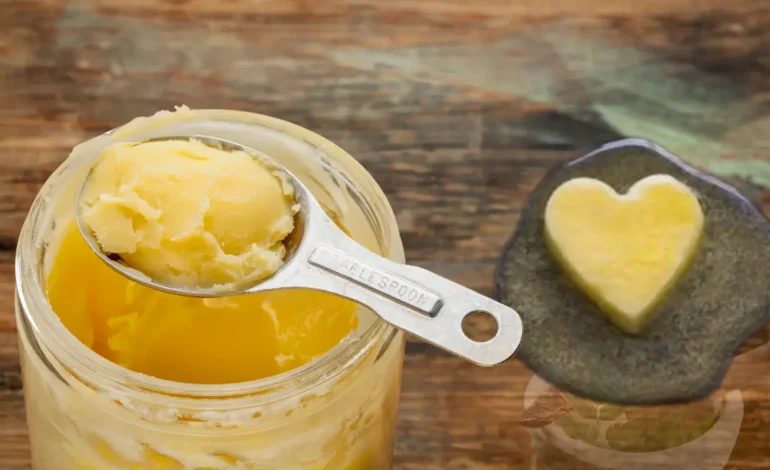
Relation between ghee and heart

Ghee, or clarified butter, has been a key part of Indian cooking and traditional medicine for centuries. Its rich flavor and high smoke point make it great for cooking, but there’s been debate about how it affects heart health. Let’s explore the facts about ghee and your heart.
What is Ghee?
Ghee is made by heating butter to remove water and milk solids, leaving behind pure butterfat. It contains various fats, including saturated and unsaturated fats.

Ghee’s Nutrients
Ghee is rich in vitamins A, D, E, and K, which are important for health. It also has butyrate, a fatty acid that benefits the gut, and conjugated linoleic acid (CLA), which may support heart health.
The Saturated Fat Concern
Ghee is high in saturated fat, which has been linked to higher LDL cholesterol (“bad” cholesterol) and heart disease. However, recent research suggests that not all saturated fats have the same effect, and their impact can vary.

Ghee and Cholesterol
Some studies suggest that moderate ghee consumption does not raise cholesterol levels and may even improve the ratio of HDL (“good” cholesterol) to LDL. CLA in ghee might help reduce body fat and improve heart health.
Anti-Inflammatory Benefits
Ghee contains butyrate, which has anti-inflammatory properties and supports gut health. Reducing inflammation can help protect against heart disease.
Traditional Uses

In Ayurvedic medicine, ghee is seen as a healing food that aids digestion and nutrient absorption. While traditional uses provide insights, they should complement, not replace, scientific evidence.
Moderation is Important
Moderation is key with ghee, as with any fat. Too much fat can lead to weight gain and health issues affecting the heart. Include ghee as part of a balanced diet with healthy fats, proteins, grains, fruits, and vegetables.
Conclusion
Ghee can be a heart-healthy addition to your diet when used in moderation. Its nutrients and potential benefits make it a valuable cooking fat. Always consider your overall diet and lifestyle for heart health. If you have heart conditions or health concerns, consult a healthcare professional before making dietary changes.
By blending traditional wisdom with modern science, you can make informed choices that support your heart and overall well-being.


